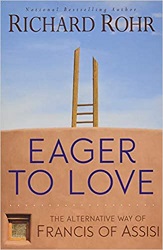
 Eager to Love
Eager to LoveThe Alternative Way of Francis of Assisi
Review posted February 26, 2021.
Franciscan Media, Cincinnati, Ohio, 2014. 294 pages.
Review written January 27, 2021, from a library book
Starred Review
Ever since I read Richard Rohr’s book The Universal Christ, I’ve also been reading the daily meditations he sends out from the Center for Action and Contemplation. This book explains the Franciscan tradition and Christian mysticism. He looks closely at Francis of Assissi’s life and teachings as well as those that followed him – and focuses on what that can mean for Christians today.
It's hard for me to describe this book, except to say it’s lovely and uplifting. I’m not sure I fully grasped all the implications. I’ll write out the very beginning, to give you some of the flavor:
Francis of Assisi was a master of making room for the new and letting go off that which was tired or empty. As his first biographer said, “He was always new, always fresh, always beginning again.” Much of Francis’s genius was that he was ready for absolute “newness” from God, and therefore could also trust fresh and new attitudes in himself. His God was not tired, and so he was never tired. His God was not old, so Francis remained forever young.
There are always new vocabularies, fresh symbols, new frames and styles, but Francis must have known, at least intuitively, that there is only one enduring spiritual insight and everything else follows from it: The visible world is an active doorway to the invisible world, and the invisible world is much larger than the visible. I would call this mystical insight “the mystery of incarnation,” or the essential union of the material and the spiritual worlds, or simply “Christ.”
Our outer world and its inner significance must come together for there to be any wholeness – and holiness. The result is both deep joy and a resounding sense of coherent beauty. What was personified in the body of Jesus was a manifestation of this one universal truth: Matter is, and has always been, the hiding place for Spirit, forever offering itself to be discovered anew. Perhaps this is exactly what Jesus means when he says, “I am the gate” (John 10:7). Francis and his female companion, Clare, carried this mystery to its full and lovely conclusions. Or, more rightly, they were fully carried by it. They somehow knew that the beyond was not really beyond, but in the depths of here.
In this book, I want to share with you one of the most attractive, appealing, and accessible of all frames and doorways to the divine. It is called the Franciscan way after the man who first exemplified it, Francesco de Bernardone, who lived in Assisi, Italy, from 1182-1226.
This isn’t a book of history, though it does tell the reader much about the teachings of Saint Francis and his followers. But the approach is talking about how we can incorporate these ideas into our own lives. It’s ultimately a challenging and uplifting book, and at some point I want to read it again and see if I can absorb more of it.
At its heart, this is a book about getting better at loving. Here’s a paragraph from a chapter specifically on Francis that shows where the title came from:
If your only goal is to love, there is no such thing as failure. Francis succeeded in living in this single-hearted way and thus turned all failure on its head, and even made failure into success. This intense eagerness to love made his whole life an astonishing victory for the human and divine spirit, and showed how they can work so beautifully together.
